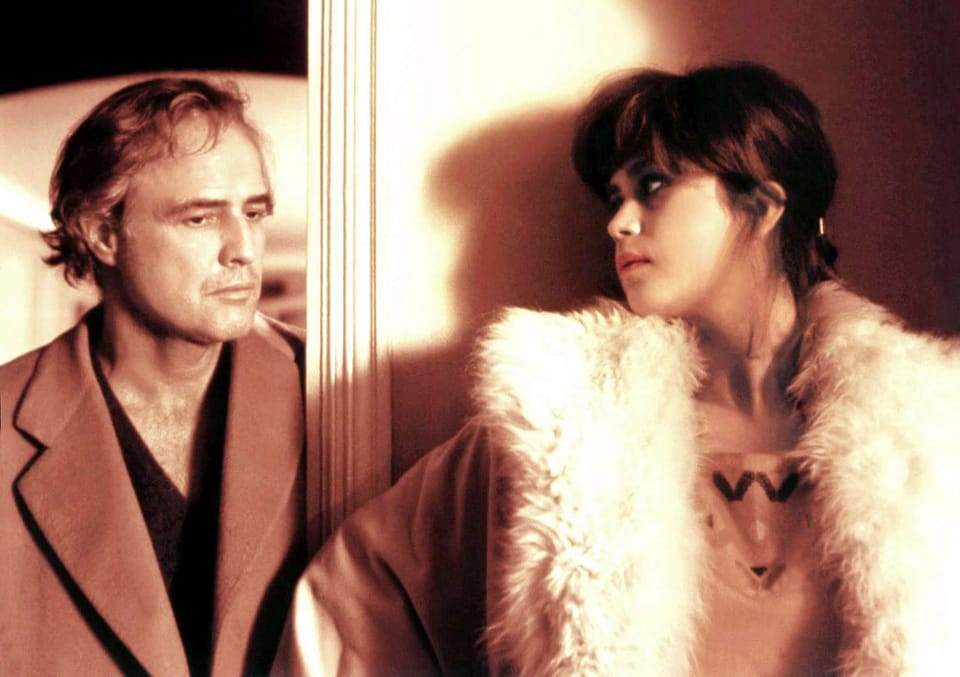How Marlon Brando Changed Hollywood With a Stick of Butter

By the time he starred in Last Tango in Paris, Marlon Brando was a legend. Two Oscar wins (one of which he rejected to promote Native American rights), lauded for nuanced performances in On the Waterfront and Streetcar Named Desire, not to mention his genre-defining turn as crime boss Don Corleone in The Godfather. He took the role of the mysterious Paul in Bernardo Bertolucci's erotic drama for a huge cut of the film's profits, by some reports more than 10%. It was clear to all on set that Brando was the star, and his face remained on screen for the majority of the film.
The film opens with Brando's Paul on a street in Paris, screaming with his hands over his ears as a train passes above him. This is a withered, yet not unattractive Brando, wisened to his years, even perhaps changed by his time in Hollywood. The first act of the film passes in a lull of quiet scenery. Brando meets a young woman and rents an apartment from her. They talk; he seduces her; they agree to keep their relationship anonymous.
Coming off the restrictive Hays Code that prevented any depictions of objectionable behavior in old Hollywood, the auteur filmmakers of the early '70s treated sexuality with a nervous hesitance. Young trailblazers like Francis Ford Coppola and Mike Nichols inserted some conversation on the matter and even an occasional plot line (the affair in The Graduate, Kay's abortion in The Godfather: Part Two), but graphic depictions of the act itself were limited to low budget pornos financed by Hollywood mafiosos and given lurid names like Deep Throat.
Last Tango in Paris was different, largely because Bertolucci was. The Italian director was notoriously difficult to work with on set (as was Brando) and unafraid of artistic conflict. Hence the film's second act, which is almost entirely sex scenes. Brando penetrates, is penetrated, kisses roughly, tears the clothes off of Maria Schneider's Jeanne. He pins her to the floor, he nuzzles her in the shower and, in one memorable sequence, rapes her with a stick of butter.
This is the new Hollywood. Nothing would ever be the same.
Now, sex is glamorous, it is profane, it is symbolic, but it is always on-screen, sometimes in raw and hurtling ways. Take 2022's X, which has a whole storyline that revolves around pornography; take 2023's Saltburn, with its infamous bathtub scene, or even more casual representations, such as those that appear in popular TV dramas like The Sopranos or Euphoria. Sex is so integral to our modern films and series that it is difficult to imagine an artistic landscape without it. Yet, visceral scenes like those presented in Last Tango in Paris are the reasons we have those today; they titillated and scared audiences into eventually accepting nudity and eroticism into the mainstream.
Recently, accounts have surfaced that the climatic scene with the kitchen foodstuff was not consensual and that Schnieder was not warned of it happening in advance; the rape in the film may have been a rape in real life as well. Schnieder said of the incident, "I felt humiliated and to be honest, I felt a little raped, both by Marlon and by Bertolucci."
Brando died in 2004. Bertolucci, horrifically, expresses no remorse for his actions. "Maybe, sometimes in the movie, I didn’t tell her what was going on because I knew her acting would be better. So, when we shot this scene with Marlon [Brando] using butter on her, I decided not to tell her. I wanted a reaction of frustration and rage." It's difficult to see his words as anything but a man sacrificing a woman's personhood for his own vision, which is far too common, especially in the pre-#MeToo world of the 1970s.
Maybe Hollywood lost something with Last Tango in Paris. Its decency. Its innocence. But it gained something else: rawness, sincerity, reality. And, sometimes, sex.
In the final scene of Last Tango in Paris, Brando's Paul chases Schnieder's Maria through the streets. He finally wants to sacrifice anonymity and accept their relationship, yet Maria is frightened by this sudden overture. He follows her into her apartment, where she shoots him out of fear. He dies on her balcony.
Brando's final line is perhaps telling. As he examines her apartment, he mumbles, "It's a little old. But full of memories."
